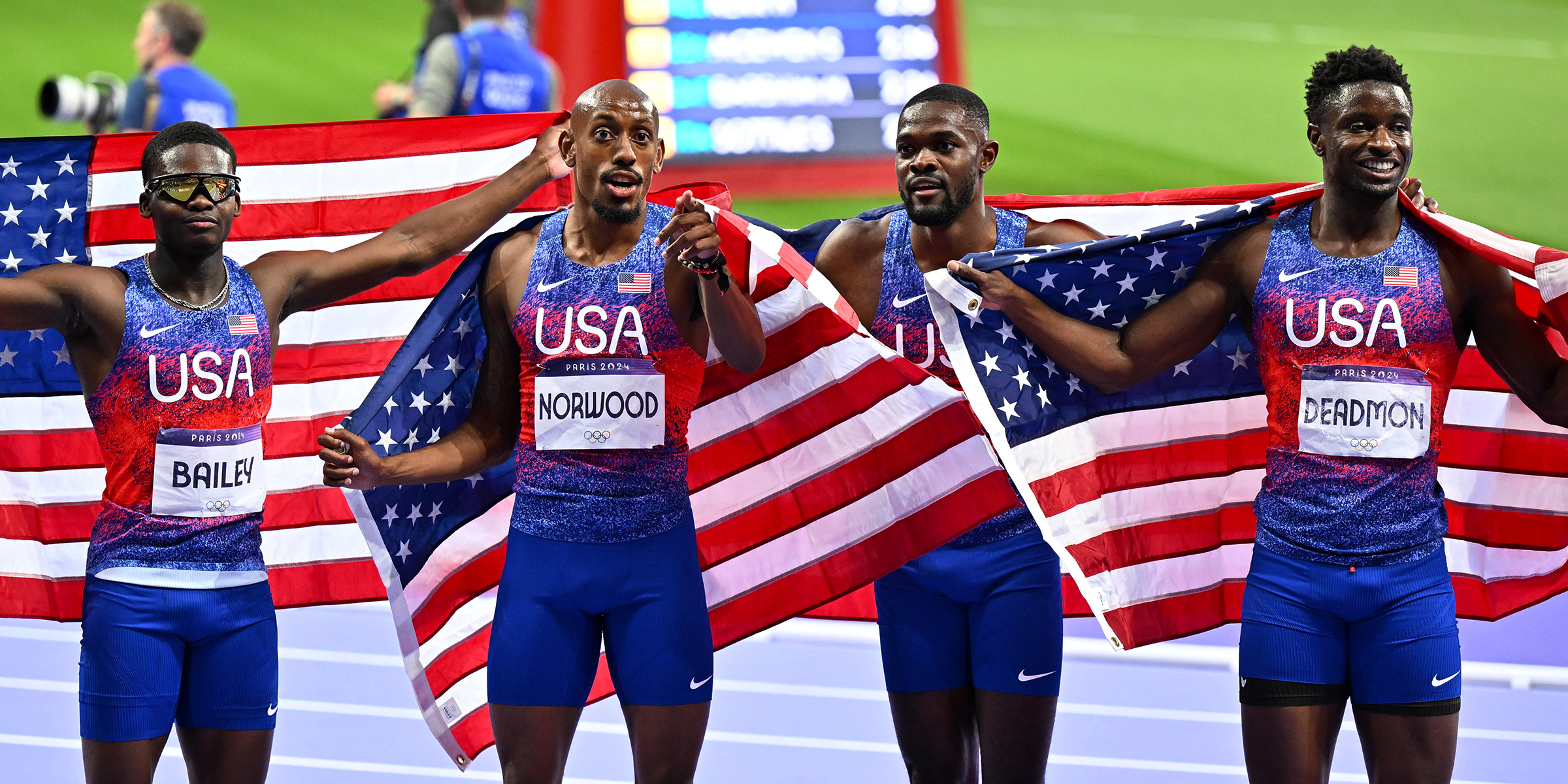
'Disappointed': The U.S. Men's Track and Field Team Was Disqualified – Here Are 3 Reasons That Led to It
From poor chemistry to a botched handoff, here are the three pivotal reasons the U.S. Men's Track and Field Relay Team's dreams of bringing home a gold medal at the 2024 Paris Olympics were crushed and ended in a disqualification.
The Olympic medal drought for the U.S. Men's 4×100-meter Relay Team will now stretch to the 2028 Los Angeles Olympics. In Paris, the squad was disqualified, marking yet another relay disaster in a string of missteps dating back to 1995.
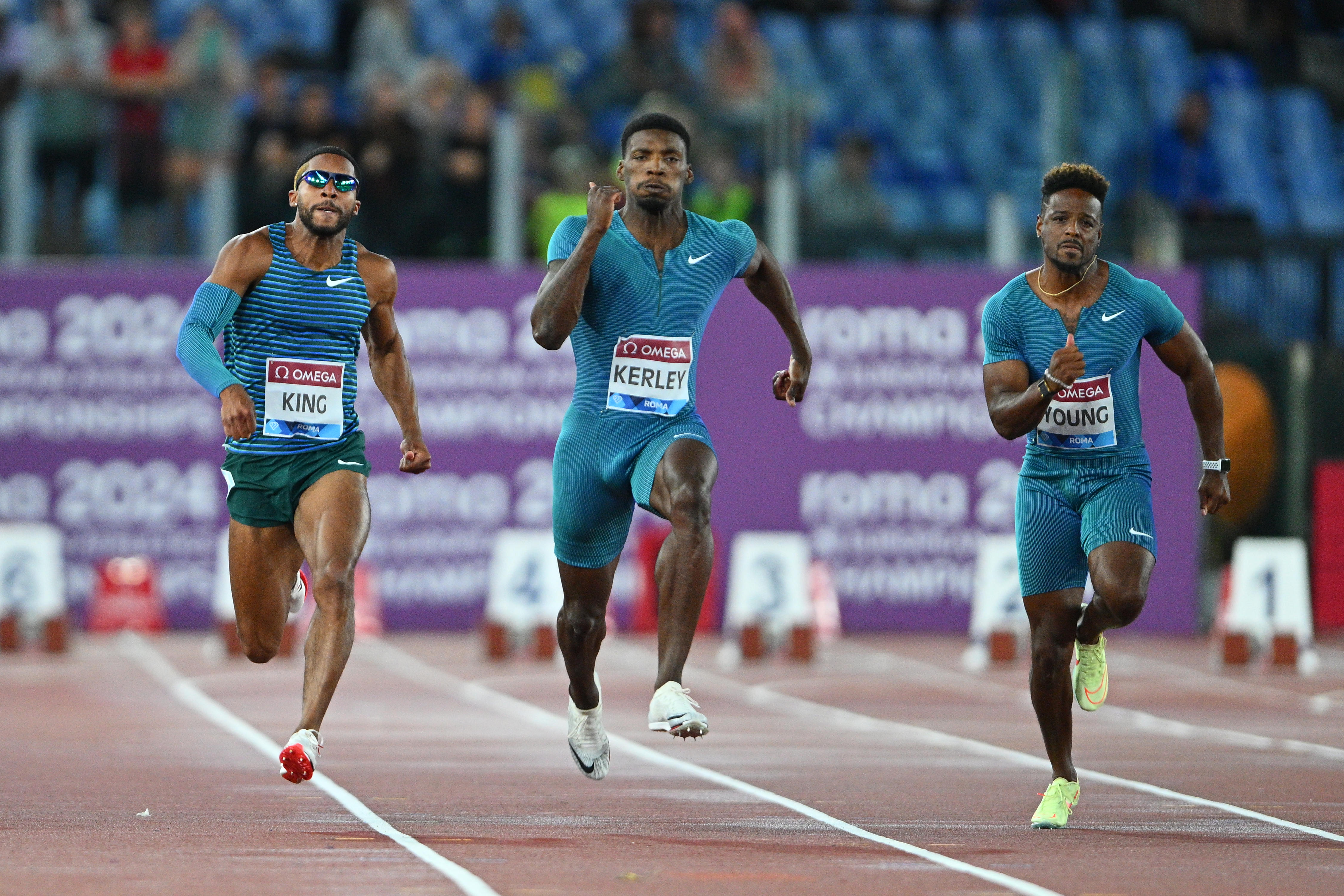
Kyree King, Fred Kerley, and Isiah Young of Team United States competing in Men's 100-meter race during the 2022 Diamond League series on June 9, in Rome, Italy. | Source: Getty Images
The U.S. team has struggled with baton exchanges, leading to 11 dropped batons, disqualifications, or bans in both the Olympics and World Championships. Their most recent mishap at the Paris Olympics, left the American team empty-handed again, with Canada capitalizing and winning gold.
South Africa took silver, and Great Britain secured bronze. But what led to their recent disqualification? Explore the three pivotal reasons for the U.S. Men's 4×100-meter Relay Team's downfall at Stade de France.
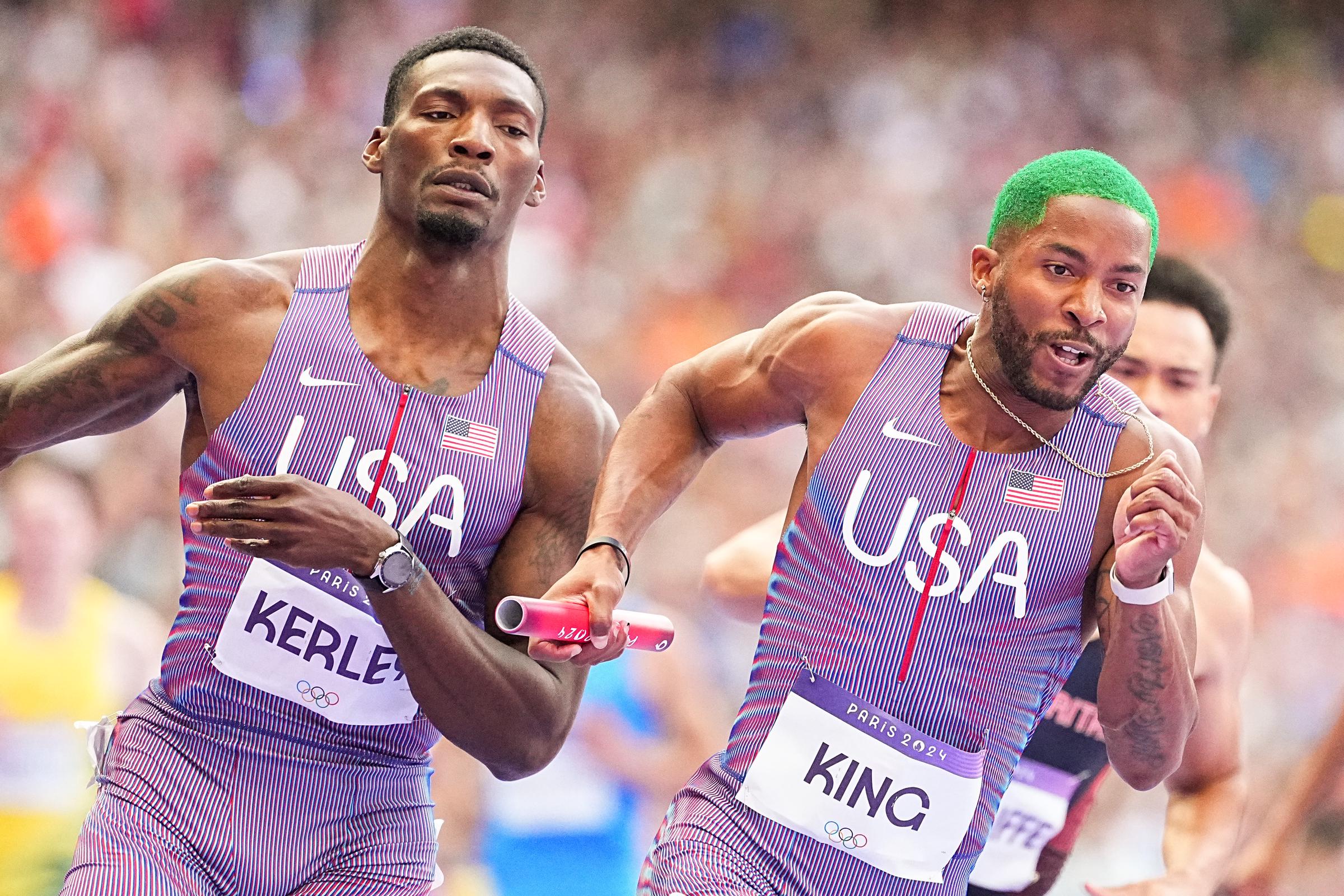
Kyree King and Fred Kerley of Team United States competing in the Men's 4x100-meter preliminary heats at the Stade de France on August 8, 2024, in France. | Source: Getty Images
Reason 1– Poor Chemistry and Noah Lyles' Absence
The U.S. Men's Track and Field Relay Team, known for its dominance in relays, found itself in a tough spot during the 2024 Paris Olympics. The squad for the opening round included Christian Coleman, Fred Kerley, Kyree King, and Courtney Lindsey.
They secured a first-round victory with a time of 37.47 seconds, thanks to solid baton exchanges, advancing easily to the final. But changes made between the rounds disrupted the team's rhythm, leading to their disqualification.
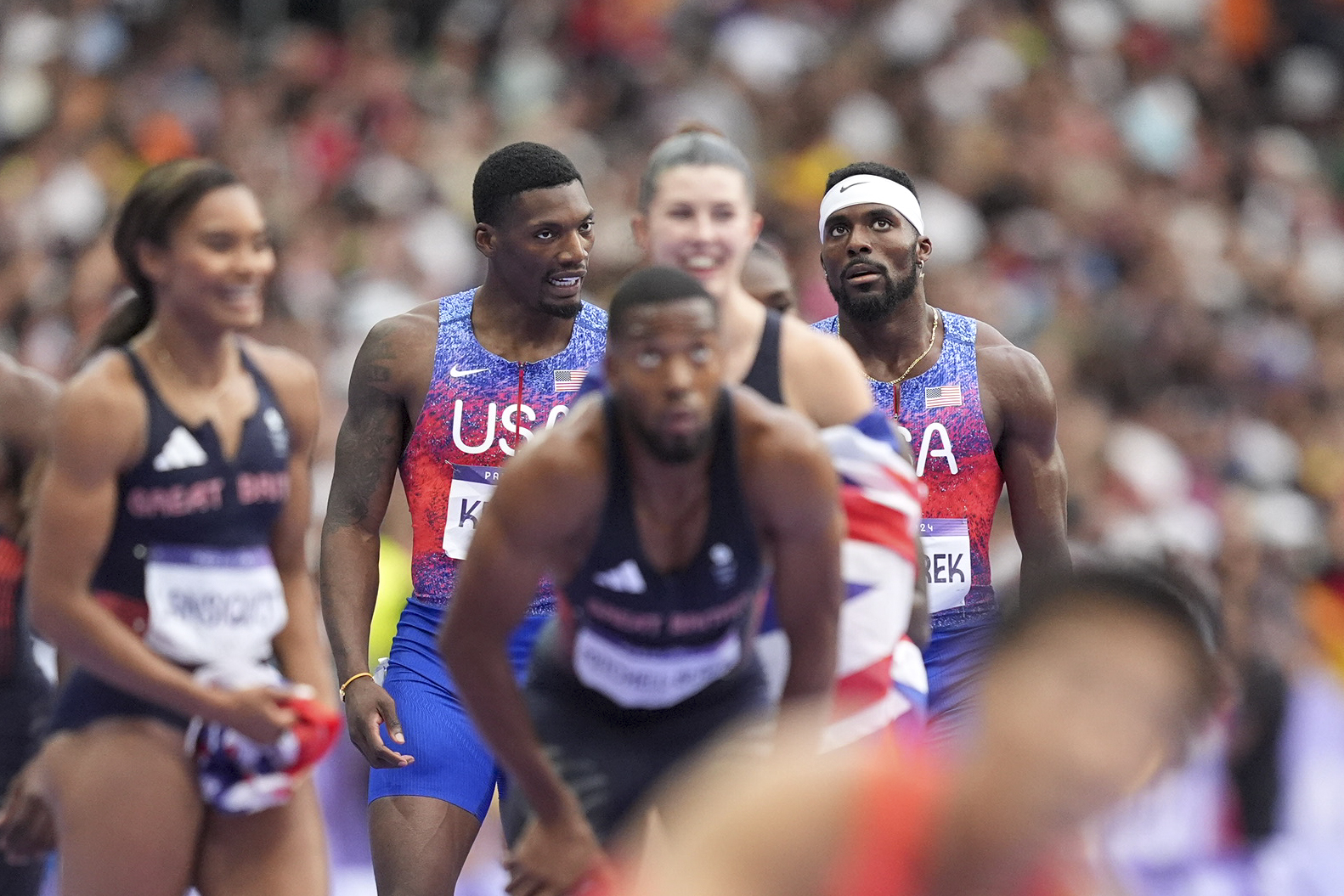
Kenneth Bednarek and Kyree King of Team United States after competing in the Men's 4x100-meter Relay Final at the Stade de France during the 2024 Summer Olympics on August 9 in France. | Source: Getty Images
Before the final, the U.S. coaches made a crucial substitution, replacing Lindsey with Kenneth Bednarek. This wasn't just a simple swap; it also involved changing the order of the runners.
Coleman stayed in the leadoff position, Bednarek moved to the second leg, King took the third, and Kerley anchored the team. While these changes were likely meant to optimize performance, they instead disrupted the team's chemistry.
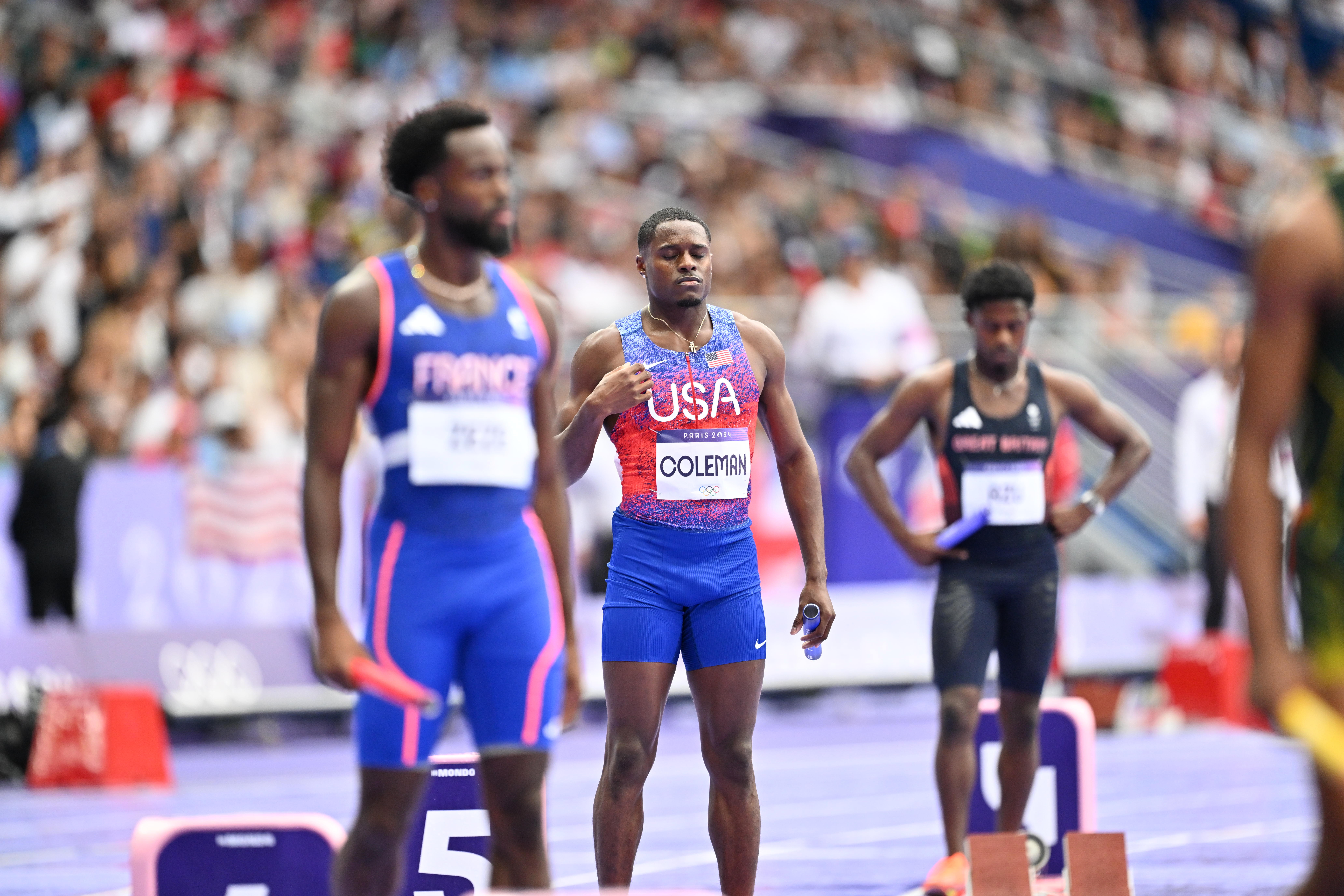
Christian Coleman of Team United States ahead of the Men's 4x100-meter Relay Final. | Source: Getty Images
Chemistry in relay races is crucial. Not only do the runners need to be fast, but they also need to be in sync, with perfect timing during baton exchanges. The lack of chemistry between the runners became clear in the final, especially between Coleman and Bednarek.
The team's chemistry was further disrupted by the absence of Noah Lyles, who was supposed to be part of the relay team. Lyles, a key figure in American sprinting, had to withdraw from the competition after testing positive for COVID-19.
The sudden loss of such a crucial team member undoubtedly impacted the morale and performance of the remaining athletes. In an interview, Lyles described his experience, explaining how he woke up at around 5 a.m. feeling extremely unwell.
"I knew it was more than just feeling sore," Lyles admitted, recalling the moment he realized something was seriously wrong. After testing, it was confirmed that Lyles had contracted COVID-19.
Despite the devastating news, Lyles remained calm, stating that his first thought was not to panic as he had competed in worse conditions before. Determined not to let the diagnosis derail his Olympic campaign, Lyles took things one day at a time, focusing on staying hydrated and following quarantine protocols.
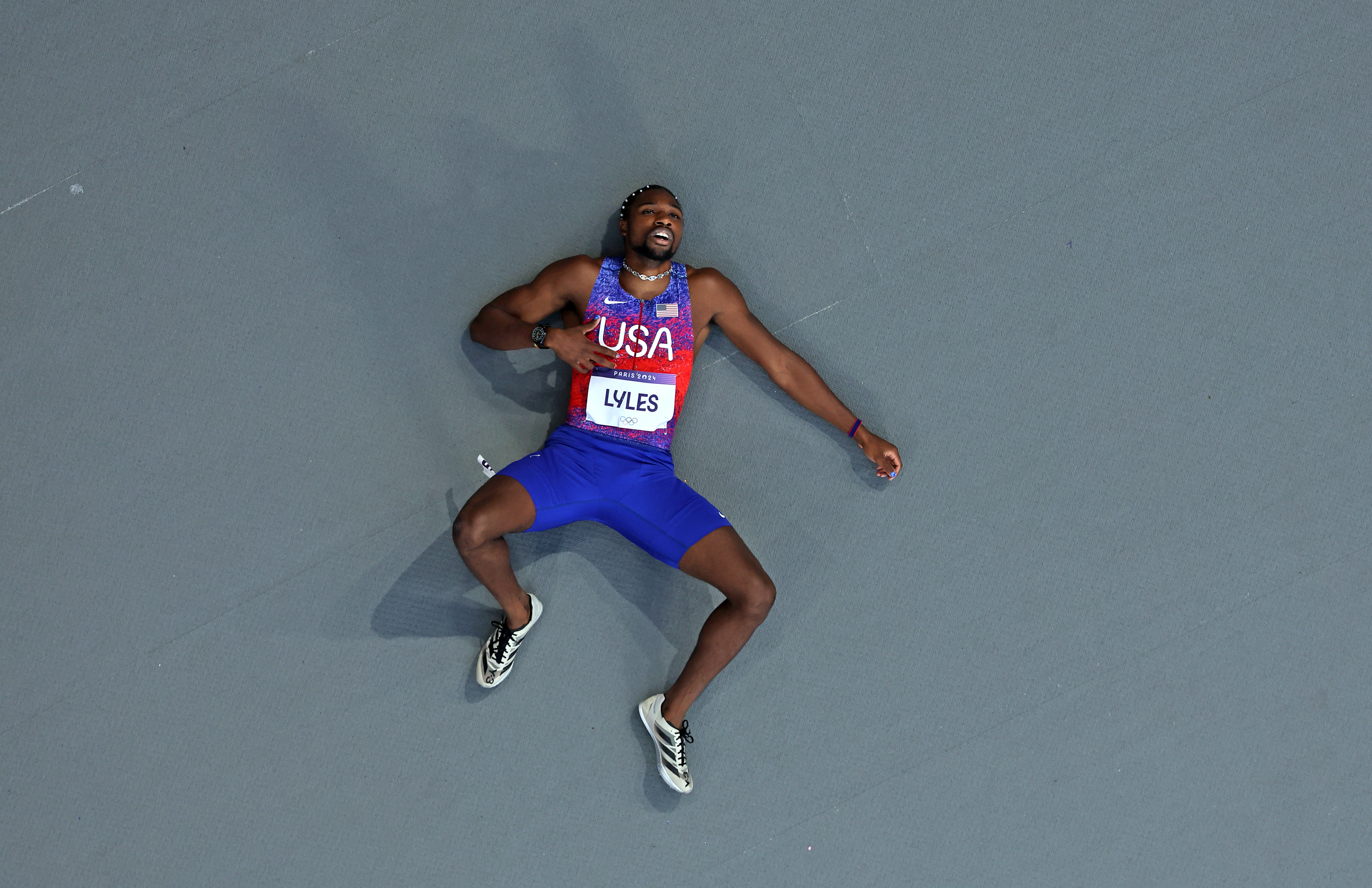
Noah Lyles after the Men's 200-meter Final during the 2024 Olympic Games in Paris, France. | Source: Getty Images
His resilience paid off as he went on to compete in the Men's 200-meter Final, securing a bronze medal just days after winning gold in the Men's 100-meter event. "I believe this will be the end of my 2024 Olympics. It is not the Olympic I dreamed of, but it has left me with so much Joy in my heart," Lyles shared on Instagram.
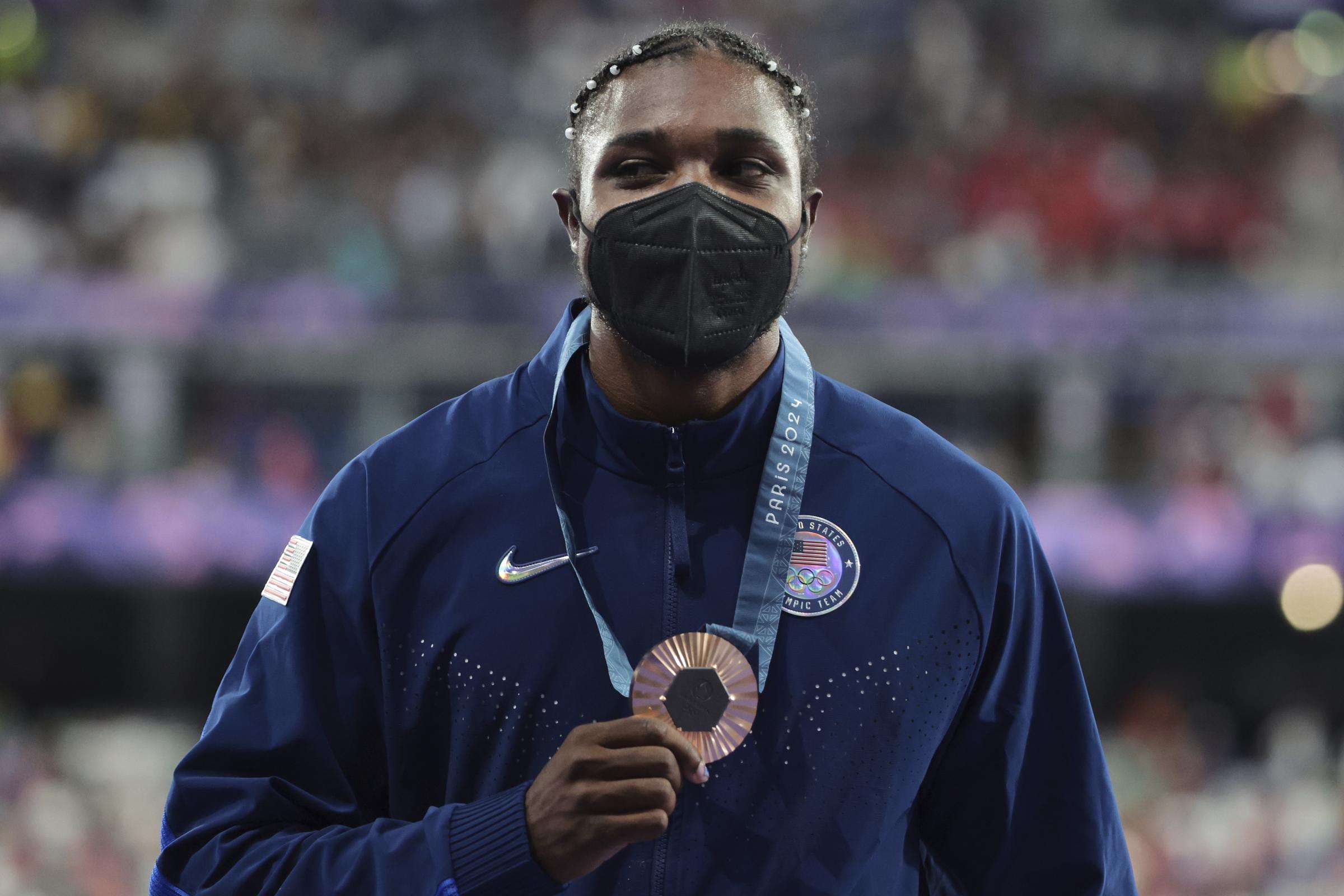
Bronze medalist Noah Lyles on the podium during the Men's 200-meter medal ceremony on August 9, 2024, in Paris, France. | Source: Getty Images
"I hope everyone enjoyed the show. Whether you were rooting for me or against me, you have to admit you watched, didn’t you? 😉See you next time," his post cheekily continued.
Lyles' absence from the relay team, however, left a void that was hard to fill. The chemistry that could have been built with him on the team never materialized, and the substitution of Bednarek, while necessary, did not produce the desired results.
Reason 2 – Kenneth Bednarek's Early Takeoff
Relay races depend as much on timing as they do on speed. For the U.S. Men's Track and Field Relay Team, a critical timing error during the handoff between Coleman and Bednarek sealed their fate.
As the second-leg runner, Bednarek was responsible for taking off at precisely the right moment — when Coleman, the first-leg runner, reached a specific mark on the track. However, in the heat of the race, Bednarek accelerated too early, a mistake that had disastrous consequences for the team.
The relay exchange zone is a carefully measured section of the track where the baton must be passed from one runner to the next. Any exchange outside of this zone results in an automatic disqualification.
Unfortunately, Bednarek's premature takeoff created a significant gap between him and Coleman, making it nearly impossible to execute a clean handoff within the designated area.
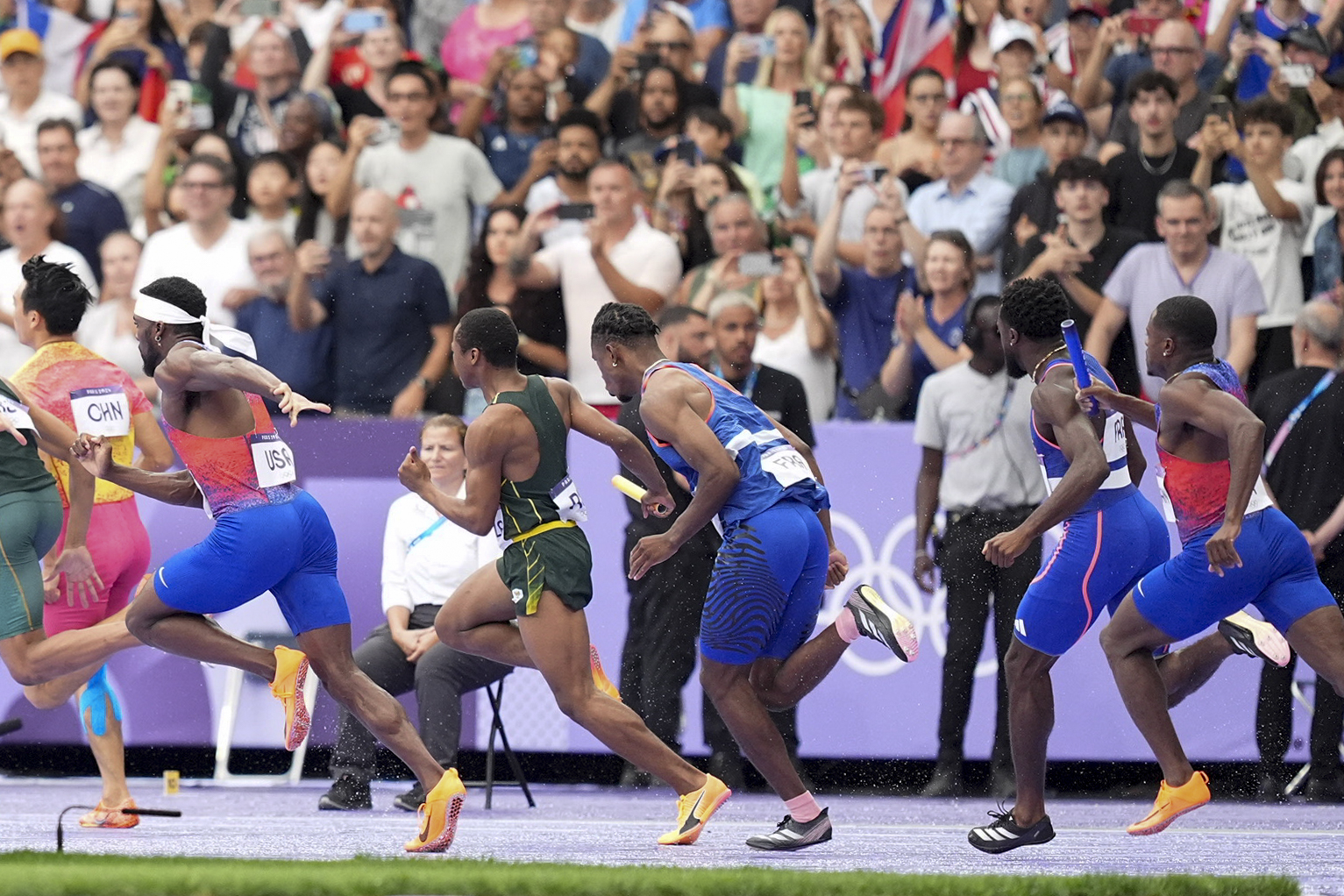
Christian Coleman attempting to pass the baton to Kenneth Bednarek during the Men's 4x100-meter Relay Final of the 2024 Summer Olympics on August 9, in France. | Source: Getty Images
As the gap widened, Bednarek had to slow down and nearly came to a stop to receive the baton, but by then, the infraction had already occurred. In relay racing, it is almost always the outgoing runner's responsibility to ensure the baton exchange occurs smoothly and within the zone.
The incoming runner's role is to maintain speed and precision, but the outgoing runner must judge the timing perfectly. Bednarek's early departure disrupted this delicate balance, leading to a faulty exchange that ultimately disqualified the team.
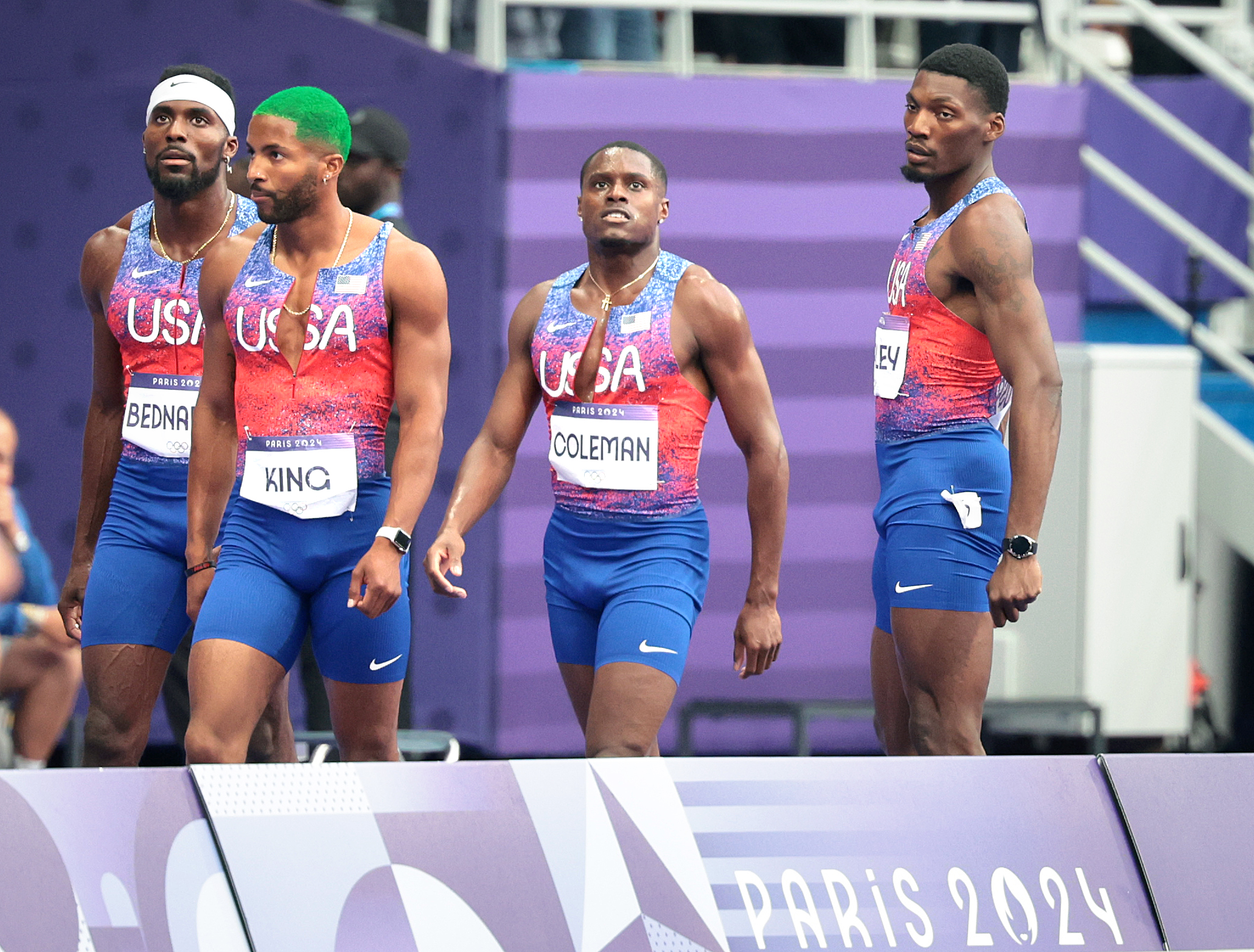
Kenneth Bednarek, Kyree King, Christian Coleman, and Fred Kerley after competing in the Men's 4x100-meter Relay Final during the 2024 Summer Olympics on August 9, in France. | Source: Getty Images
This moment was especially crushing because the team had made it through the first round with a strong performance. The pressure of the moment, combined with the earlier disruption in team chemistry, likely contributed to Bednarek's misjudgment.
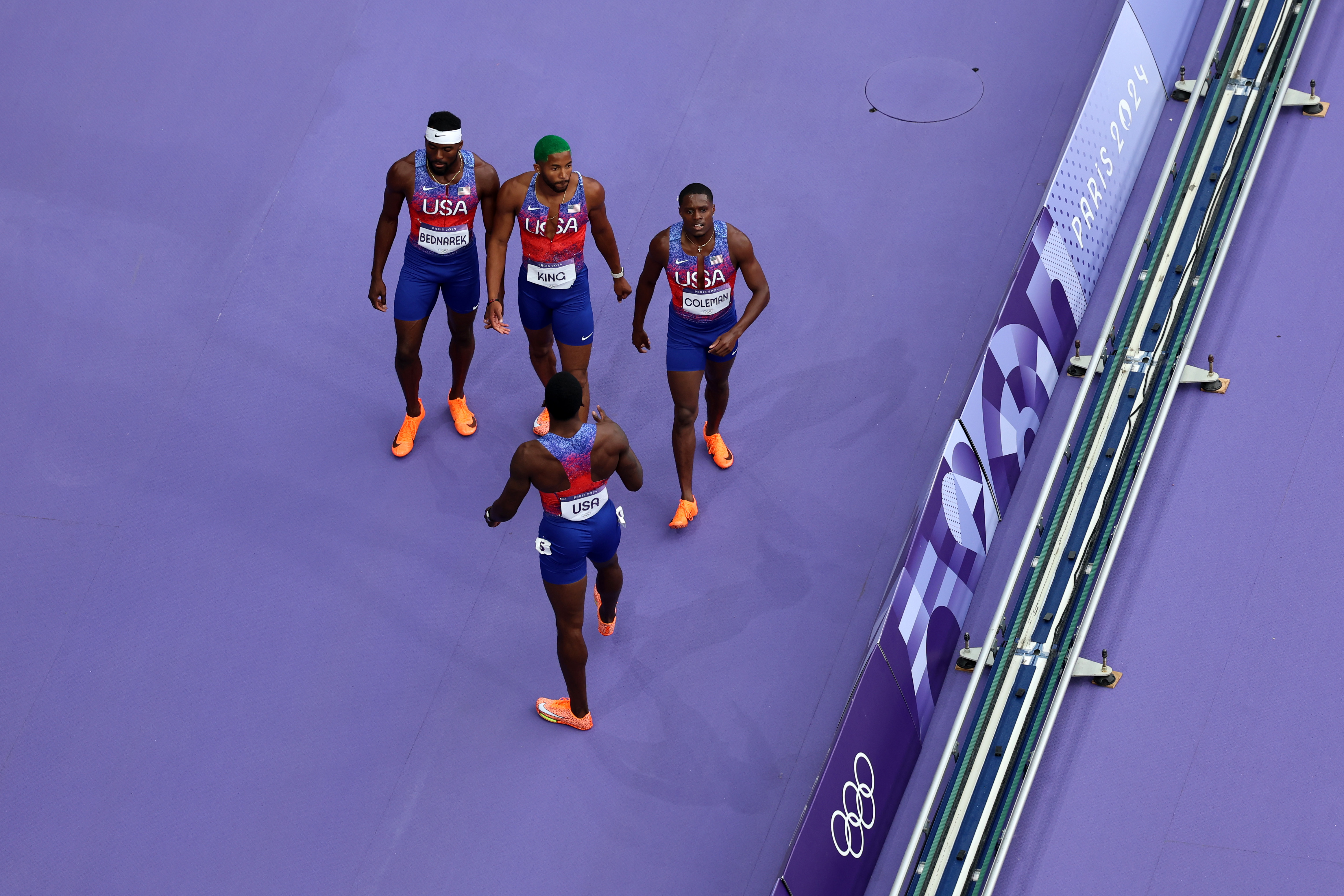
Kenneth Bednarek, Christian Coleman, Fred Kerley, and Kyree King reacting to being disqualified from the Men's 4x100-meter Relay Final during the 2024 Summer Olympics on August 9, in France. | Source: Getty Images
Reason 3 – Kyree King and Fred Kerley's Slow Exchange
The final handoff in a 4×100-meter relay can often make or break a race. For the U.S. Men's Track and Field Relay Team at the 2024 Paris Olympics, it made matters worse. By the time the baton was passed from King to Kerley, the team's fate had already been sealed by the earlier disqualification for a botched exchange.
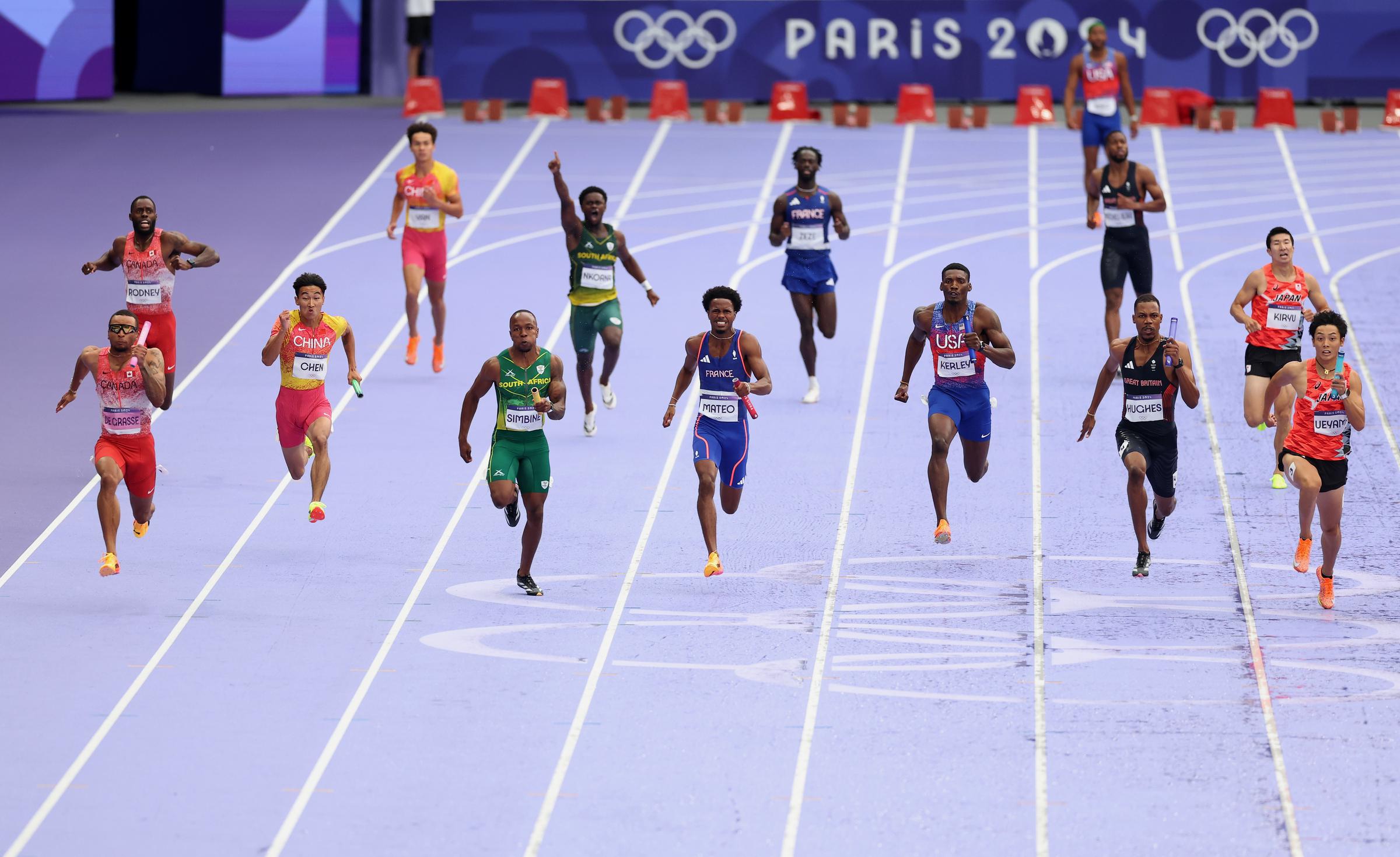
Fred Kerley and other athletes competing in the Men's 4x100-meter Final during the 2024 Summer Olympics on August 9, in France. | Source: Getty Images
However, the handoff between King and Kerley was poor, adding further frustration to an already disappointing race. In relay racing, the anchor leg — the final runner in the sequence — is critical. This athlete must receive the baton at full speed, seamlessly transitioning from one runner's momentum to their own.
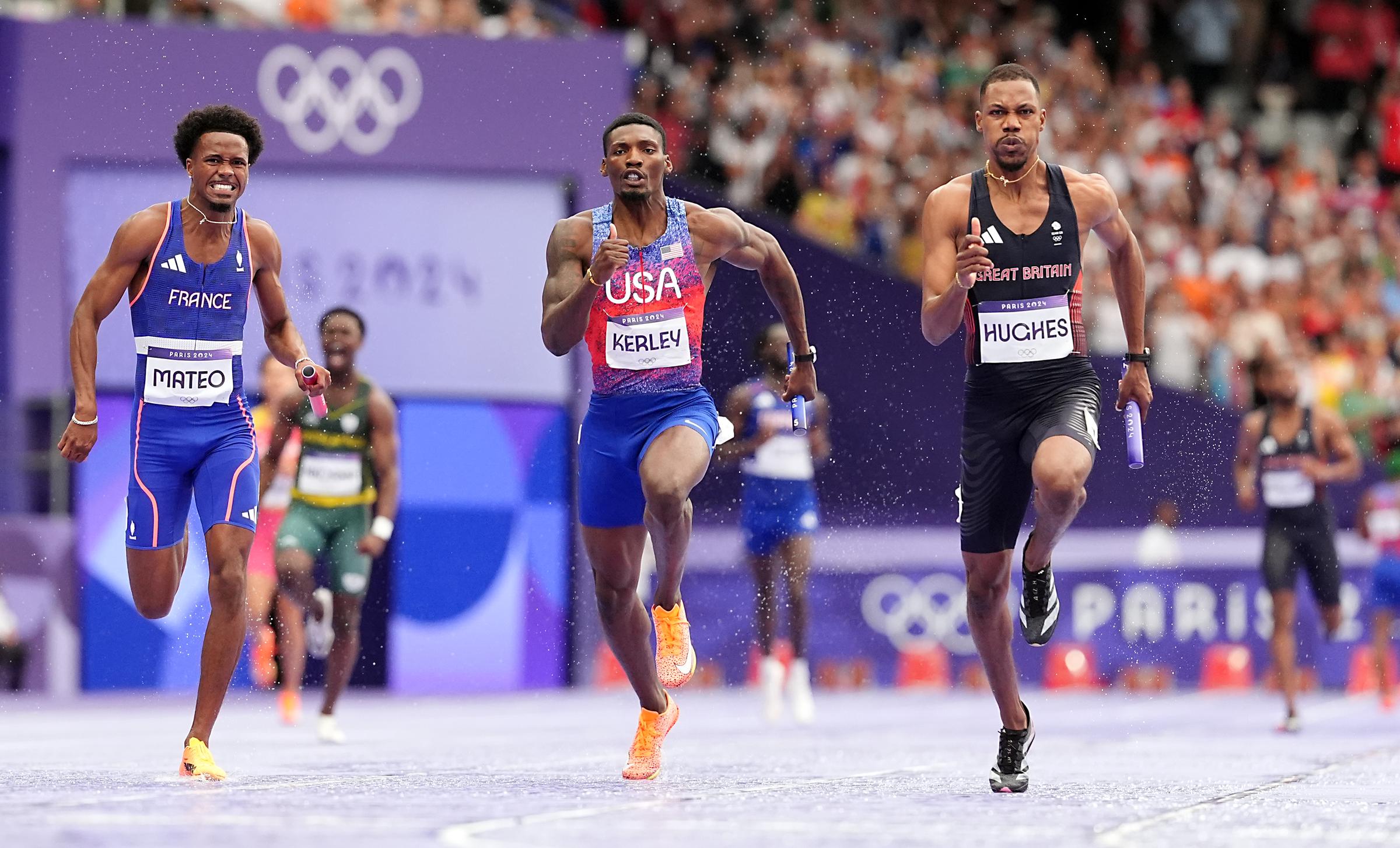
Fred Kerley competing in the Men's 4x100-meter Relay Final during the 2024 Summer Olympics on August 9, in France. | Source: Getty Images
Unfortunately, the handoff between King and Kerley lacked the necessary fluidity. Kerley, the anchor, found himself receiving the baton with little to no forward momentum, which significantly hampered his ability to sprint to the finish with the explosive power required to secure a medal.
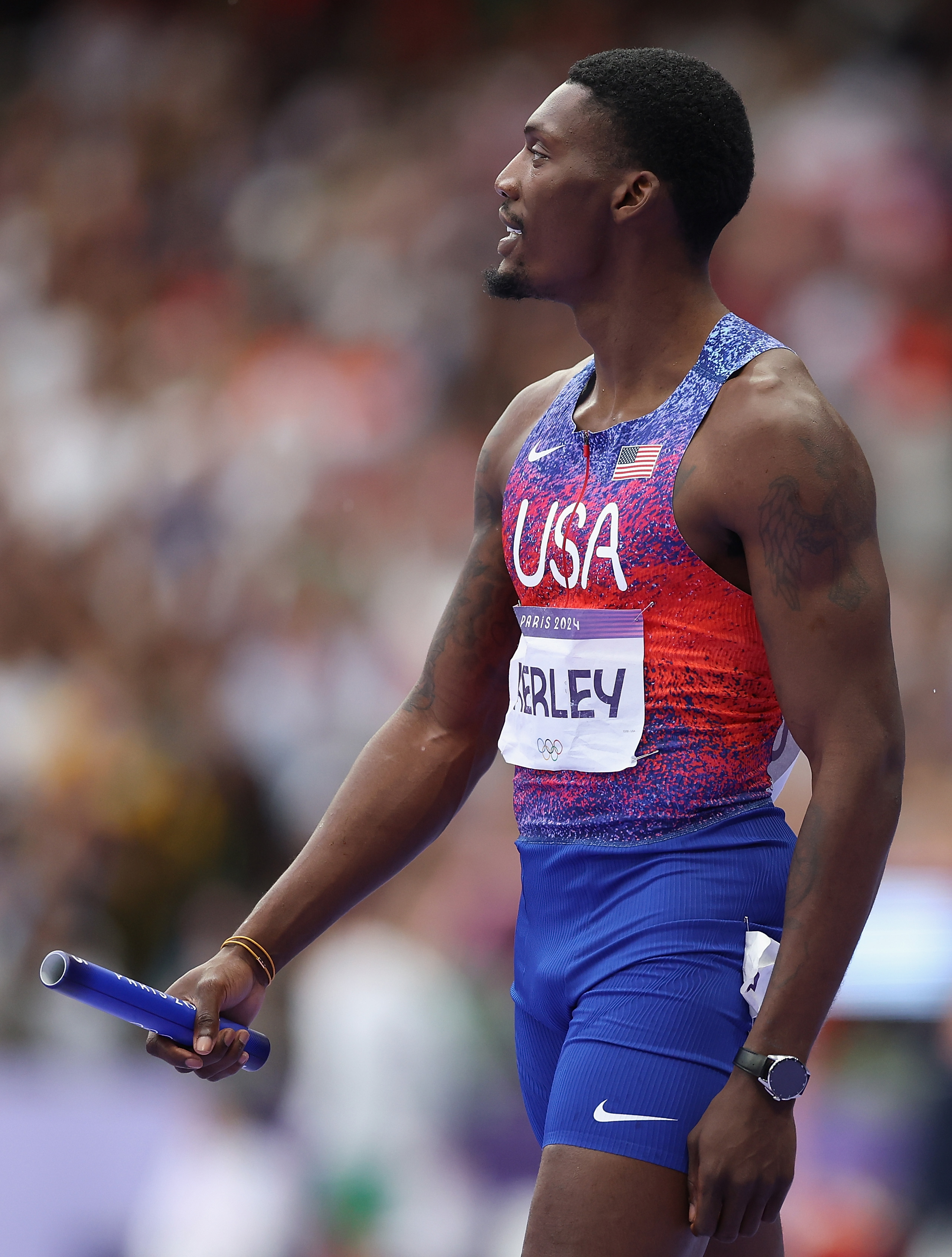
Fred Kerley after competing in the Men's 4x100-meter Relay Final during the 2024 Summer Olympics on August 9, in France. | Source: Getty Images
As a result, the U.S. team lost any chance of recovering from the earlier mistake. Coleman, reflecting on the race, expressed his disappointment. "[The handoff] just didn't happen," he told reporters.
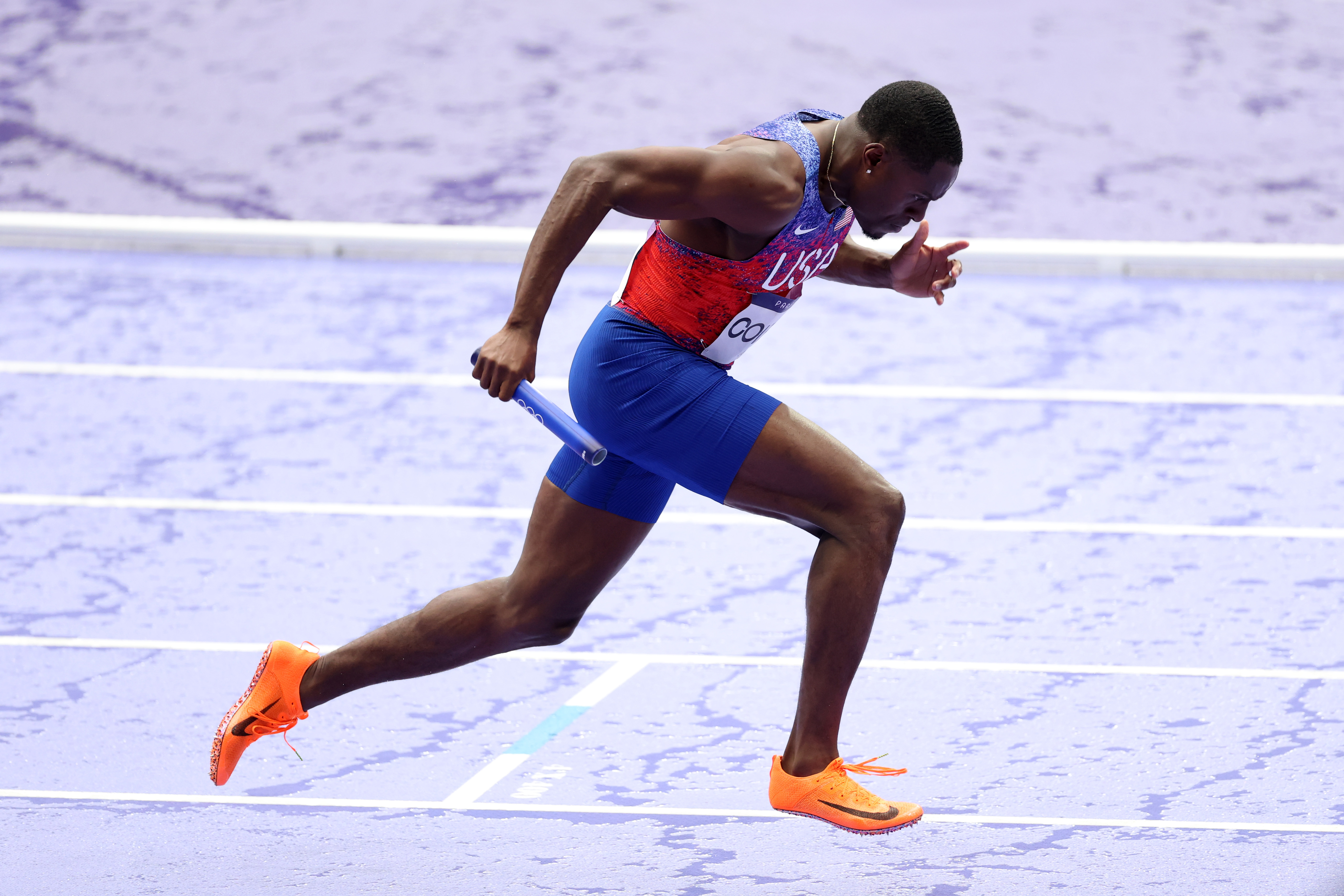
Christian Coleman competing in the Men's 4x100-meter Relay Final during the 2024 Summer Olympics on August 9, in France. | Source: Getty Images
"We practiced a lot. I mean, me and Kenny have been competitive but also teammates a few times over the years, and we felt really confident going out there. And in the moment it just...it's a part of the sport," the athlete continued.
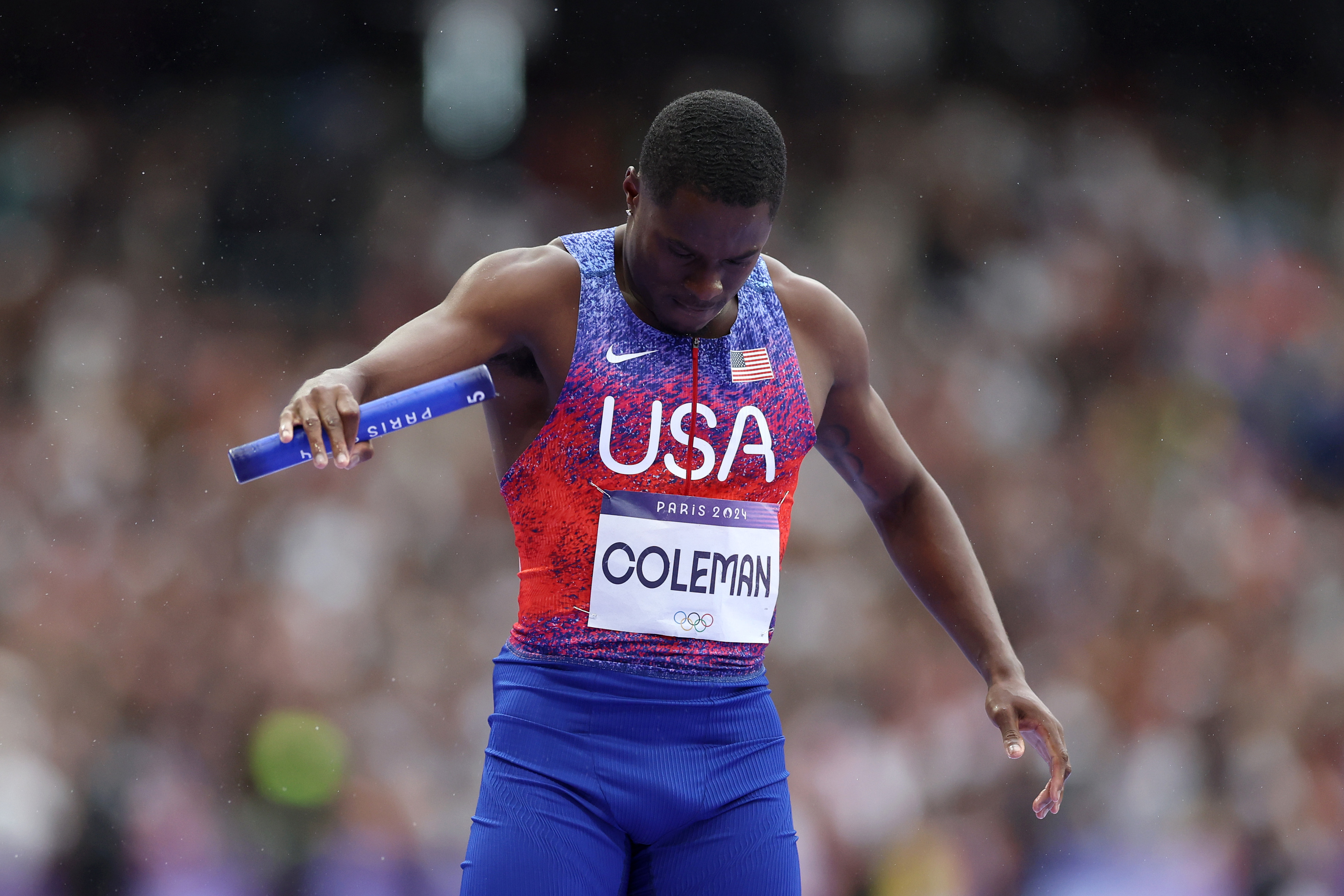
Christian Coleman after competing in the Men's 4x100-meter Relay Final during the 2024 Summer Olympics on August 9, in France | Source: Getty Images
Bednarek echoed these sentiments, acknowledging the team's frustration but also stressing the importance of perseverance. He admitted that the team could be "a little hard on ourselves," and while they were "a little disappointed," they were already looking ahead to future opportunities.
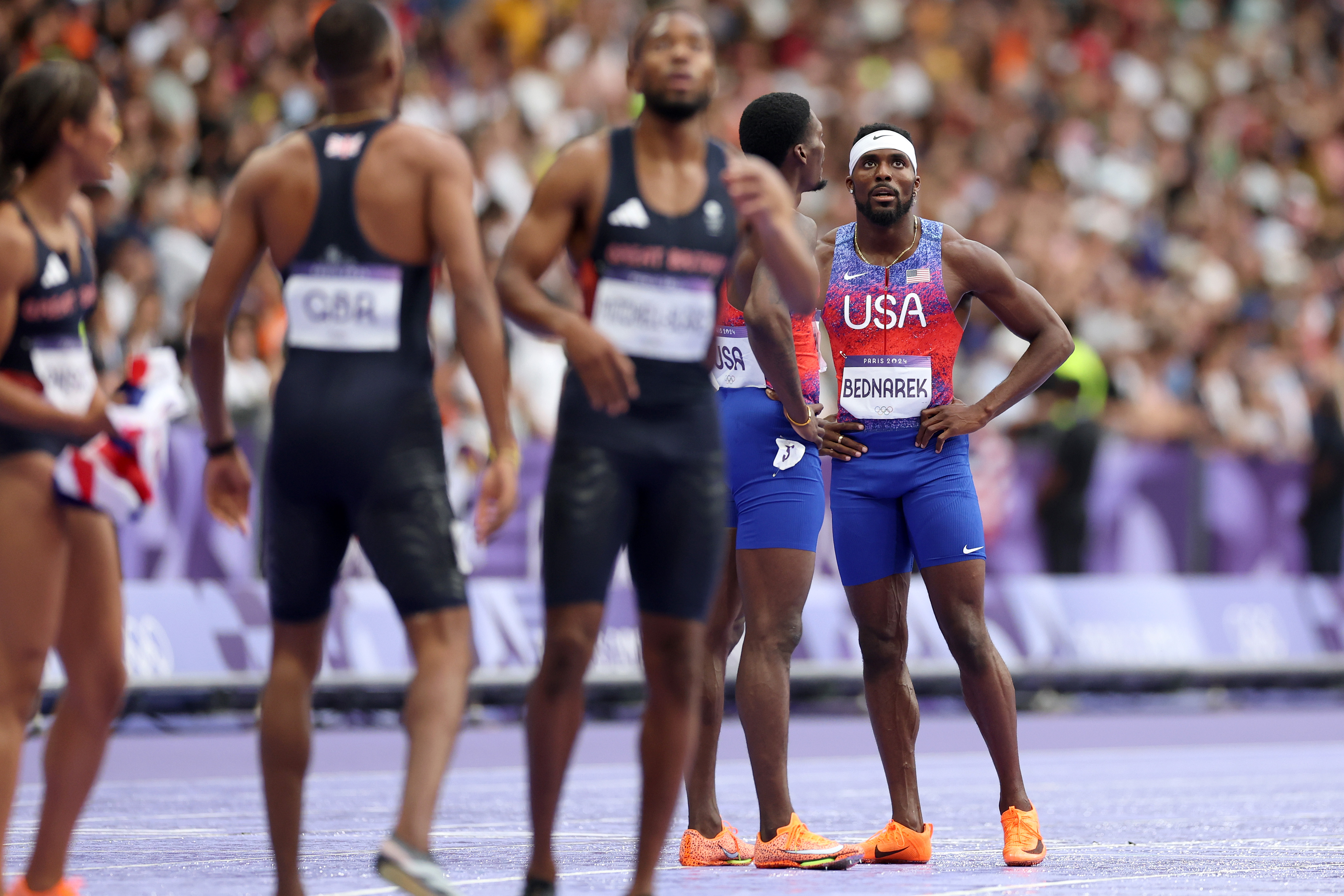
Kenneth Bednarek after competing in the Men's 4x100-meter Final during the 2024 Summer Olympics on August 9, in France. | Source: Getty Images
"It simply just didn't happen," Bednarek said. He added a note of resilience, saying, "But we're all human beings too, and we've been through ups and downs in life. This is just another one of those times where we just gotta keep our head down and keep pushing. I mean, it's a part of the sport."
Bednarek also expressed optimism about the future, especially with the next Olympics taking place on U.S. soil. "I expect all of us will be back on the team in Los Angeles. I think we'll have a little more confidence and be able to bring it on home," he shared.
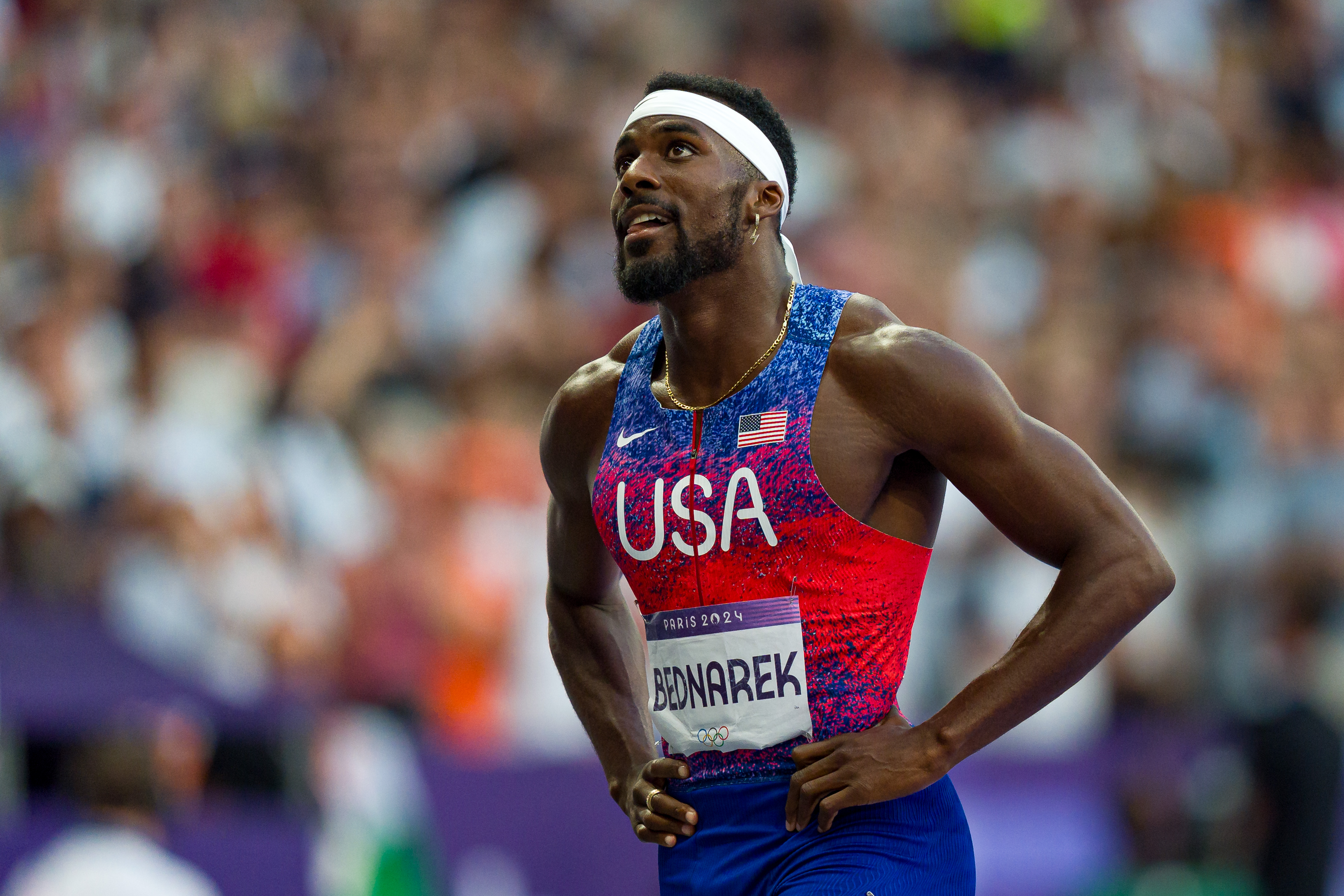
Kenneth Bednarek after competing in the Men's 4x100-meter Relay Final during the 2024 Summer Olympics on August 9, in France. | Source: Getty Images
The disappointment was not just about this particular race but about a broader pattern of struggles for the U.S. Men's Relay Team. A medal in Paris would have been the team's first in the 4×100-meter relay since they won silver in Athens in 2004.
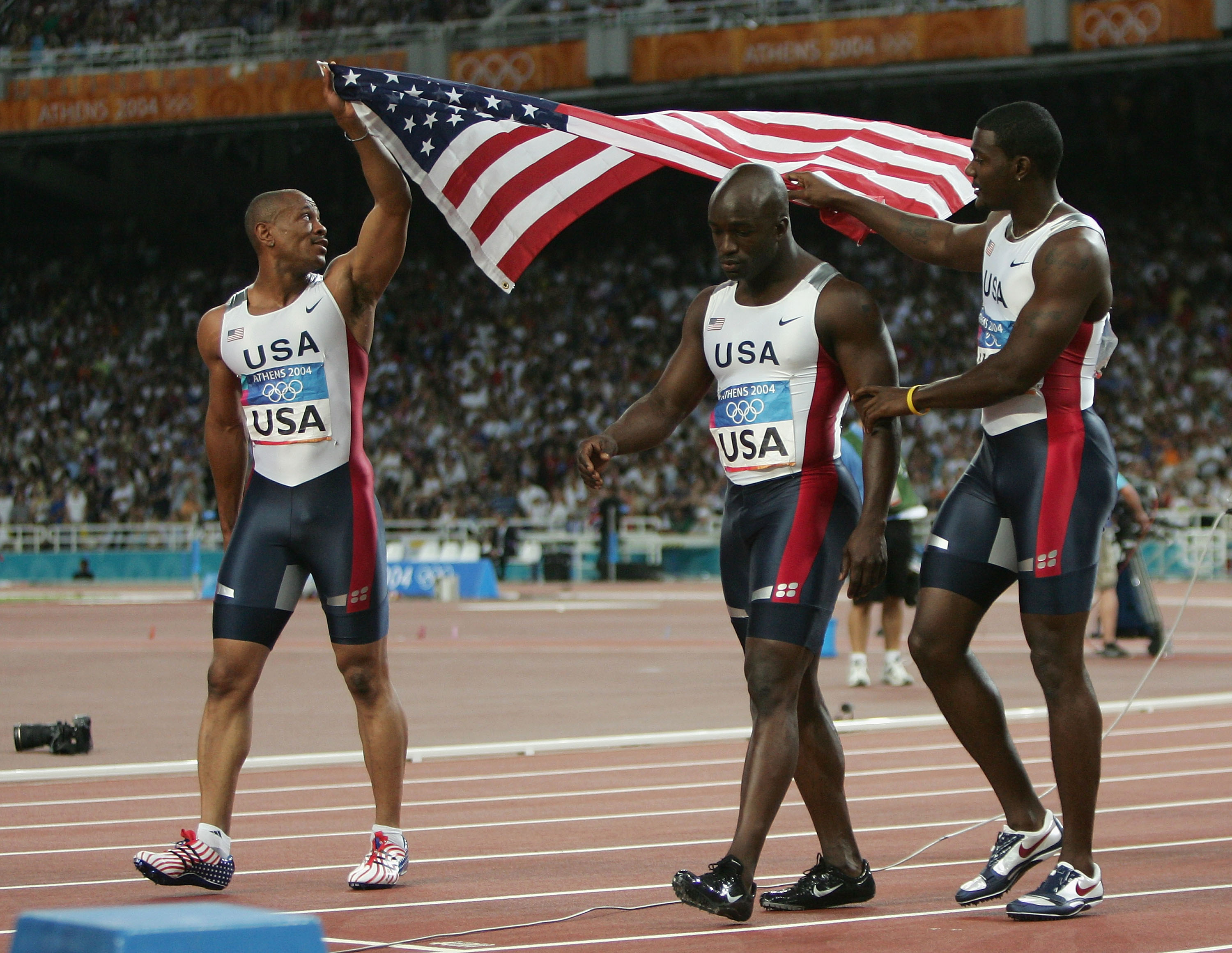
Maurice Greene, Coby Miller, and Shawn Crawford of Team United States after competing in the men's 4x100-meter Relay Final during the Athens 2004 Summer Olympic Games on August 28, in Greece. | Source: Getty Images
The U.S. Men's Team has become notorious for its difficulties with baton exchanges at major international competitions. Despite being the most successful nation in this event's history — with 15 gold medals, far more than any other country — their last gold in the 4×100-meter relay was at the 2000 Sydney Olympics.
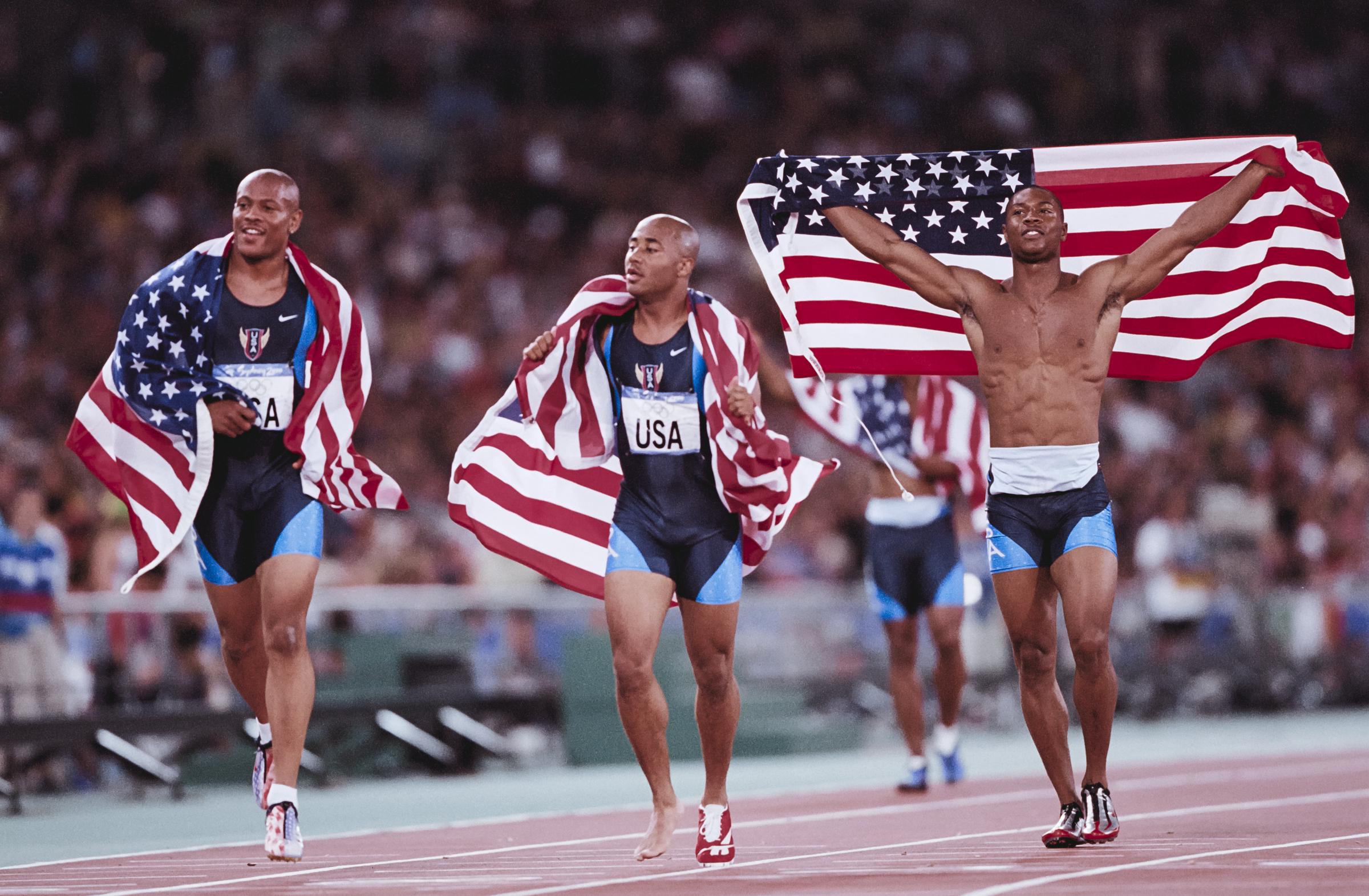
Maurice Green, Brian Lewis, and Bernard Williams III of Team United States celebrating winning the Men's 4x100-meter Relay during the 2000 Summer Olympics on September 30, in Sydney, Australia. | Source: Getty Images
Track and field legend Carl Lewis, who won nine Olympic gold medals, voiced his frustration with the U.S. relay program following the Paris disqualification. Calling for a complete overhaul, Lewis took to social media to express his views, stating, "It's time to blow up the system."
He continued, "It is clear that EVERYONE at [USA Track & Field] is more concerned with relationships than winning. No athlete should step on the track and run another relay until this program is changed from top to bottom."
Social media users had mixed reactions to Bednarek calling the disqualification a disappointment, with one person commenting, "Disappointed? How bout embarrassed!" Another social media user shared, "7th place and only disappointed." "Inexcusable," a third typed.
However, others sympathized with the team, with one person sharing, "I hurt with you guys too." Another added, "😢Sad very sad." A third user typed in part, "Bernard moved early…that made everything fall apart. I'm sure it's incredibly disappointing for all 4 of them 😢💔."
The U.S. Men's Track and Field 4×100-meter Relay Team's disappointing campaign at the 2024 Paris Olympics was the result of disrupted chemistry, poor timing, and a critical handoff error which led to a disqualification.
As the team looks toward future competitions, especially the Los Angeles Olympics, these lessons will be crucial in reclaiming their past dominance.
